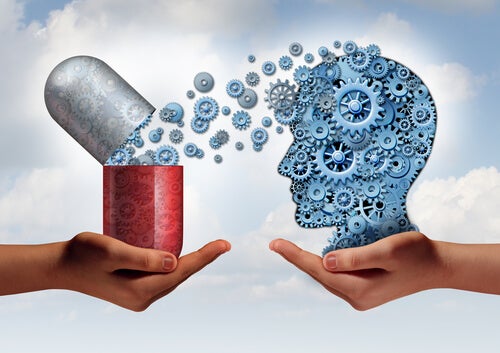Psychological Therapy or Drugs

The use of psychological therapy and drugs for treating psychological disorders is often the subject of much debate. The former has proven longer-lasting results than drugs. The reason is that a patient learns coping skills during therapy. Therapists help patients identify myths and negative thoughts and provide them with the necessary tools to challenge and replace such beliefs.
Also, these methods teach life-long skills. They don’t only allow people to feel better but also give them something to fall back on if their stressors return in the future.
Unlike drugs, psychological therapy isn’t addictive. Additionally, some studies reveal that cognitive-behavioral therapy can be more effective in relieving anxiety and depression than drugs.
However, due to the severity of some cases, some people may require a good degree of synergy between psychological therapy and drugs. Medications, psychotherapy, or a combination of both can help people cope with emotional or behavioral problems. The choice of treatment should be based on the available scientific evidence and on the patient’s willingness to try and continue these treatments.

Psychological therapy and drugs: evidence of their “good relationship”
Currently, there’s an effort to systematize the association between CBT and psychopharmacology. Also, its benefits to global treatment:
- Positive synergies between the two options can unlock communication skills, motivation, concentration, and memory, thanks to drug speed. The patient installs in a behavioral and cognitive position that allows them to assume the tasks proposed by CBT.
- CBT can increase pharmacological compliance, both in somatic and mental illnesses. CBT can “fix” adherence and even neutralize pharmacological “safety signals”. The kind that interferes with the positive effects of CBT.
- De Pablo proposes a “behavioral prescription of the drug” with implications at two levels:
-
- When pharmacology is a therapeutic activity in the broader framework of global treatment. (Don’t consider psychopharmacology fundamental and CBT secondary).
- Also, when psychopharmacology is a procedure in the service of change, it’ll eventually require other measures. Some with cognitive and behavioral variations that’ll facilitate the understanding of the comprehensive meaning of treatment.
CBT allows the drug to be “withdrawn” under more adequate conditions than its withdrawal without a protective net, reducing relapses. (Relapses after withdrawal or inappropriate decrease in psychotropic drugs were less frequent in patients undergoing CBT).
All these assumptions can complicate in cases of personality disorders. This is because paranoids reject the medication and avoidants or dependents excessively adhere to both types of treatment. The suggestibility of histrionics and the omnipotence of narcissists complicate both proposals.
Evidence of good results from the combination of psychotherapy and drugs
There are two types of psychotherapy for depression. One is cognitive-behavioral therapy and the other interpersonal psychotherapy. Also, certain pharmacology has proven helpful. Also, there’s some evidence that the combination of psychotherapy and medications can be more effective than any treatment alone. However, in the long term, it seems that psychotherapy guarantees success. Suicidal people may require hospital treatment.
For anxiety disorders, cognitive behavioral therapy, antidepressant medications, and anti-anxiety medications have proven helpful. The bulk of the research collects data that supports the hypothesis that psychotherapy is more effective than medications. Also, adding medications doesn’t significantly improve the results of psychotherapy alone.
Cognitive-behavioral therapy and environment-based therapies, as well as support programs, proved useful for excessive alcohol and drug use disorders. People with severe addictions may also benefit from adding certain medications that will reduce their cravings or the effects of poisoning.
For eating disorders, medical management may be necessary to maintain physical safety. It’s been shown that cognitive-behavioral therapy, interpersonal psychotherapy, and antidepressants are helpful. Also, some evidence suggests that the combination of psychotherapy and medications may be more effective than just one treatment.
For schizophrenia or bipolar disorder, most people will require treatment with antipsychotic medications or mood stabilizers. Research suggests adding cognitive, behavioral, or family psychotherapy to treatment. This is because it may improve functional outcomes.
Psychotherapy is usually the first recommendation for problems with parenthood, marriage, or adjustment. This treatment can help you develop skills and respond to stressors in a more appropriate way.

Personalized treatment of psychological therapy and drugs
People respond to treatments differently. Therefore, if one treatment doesn’t help, then try adding another. Research shows that psychotherapy can be helpful, even for people who don’t respond well to medications.
Both psychotherapy and medications require rigorous application and monitoring. However, results don’t generally occur overnight. Thus, you only have to start treatment if you’re willing to continue it for as long as you need to.
Patients are more likely to get involved with a treatment that makes sense to them. Therefore, it’s important to discuss the treatment thoroughly with a professional so they can explain it in a way they can understand.
Conclusion
According to several authors, the combined treatment should be superior to any of the isolated therapies. And if the magnitude of the patient’s favorable response increases, the probability and amplitude of the response based on the synergies of the two modalities increases.
Thus, combined treatment could be more acceptable, both by promoting compliance (CBT) and by speeding up the response (psychopharmacology).
The use of psychological therapy and drugs for treating psychological disorders is often the subject of much debate. The former has proven longer-lasting results than drugs. The reason is that a patient learns coping skills during therapy. Therapists help patients identify myths and negative thoughts and provide them with the necessary tools to challenge and replace such beliefs.
Also, these methods teach life-long skills. They don’t only allow people to feel better but also give them something to fall back on if their stressors return in the future.
Unlike drugs, psychological therapy isn’t addictive. Additionally, some studies reveal that cognitive-behavioral therapy can be more effective in relieving anxiety and depression than drugs.
However, due to the severity of some cases, some people may require a good degree of synergy between psychological therapy and drugs. Medications, psychotherapy, or a combination of both can help people cope with emotional or behavioral problems. The choice of treatment should be based on the available scientific evidence and on the patient’s willingness to try and continue these treatments.

Psychological therapy and drugs: evidence of their “good relationship”
Currently, there’s an effort to systematize the association between CBT and psychopharmacology. Also, its benefits to global treatment:
- Positive synergies between the two options can unlock communication skills, motivation, concentration, and memory, thanks to drug speed. The patient installs in a behavioral and cognitive position that allows them to assume the tasks proposed by CBT.
- CBT can increase pharmacological compliance, both in somatic and mental illnesses. CBT can “fix” adherence and even neutralize pharmacological “safety signals”. The kind that interferes with the positive effects of CBT.
- De Pablo proposes a “behavioral prescription of the drug” with implications at two levels:
-
- When pharmacology is a therapeutic activity in the broader framework of global treatment. (Don’t consider psychopharmacology fundamental and CBT secondary).
- Also, when psychopharmacology is a procedure in the service of change, it’ll eventually require other measures. Some with cognitive and behavioral variations that’ll facilitate the understanding of the comprehensive meaning of treatment.
CBT allows the drug to be “withdrawn” under more adequate conditions than its withdrawal without a protective net, reducing relapses. (Relapses after withdrawal or inappropriate decrease in psychotropic drugs were less frequent in patients undergoing CBT).
All these assumptions can complicate in cases of personality disorders. This is because paranoids reject the medication and avoidants or dependents excessively adhere to both types of treatment. The suggestibility of histrionics and the omnipotence of narcissists complicate both proposals.
Evidence of good results from the combination of psychotherapy and drugs
There are two types of psychotherapy for depression. One is cognitive-behavioral therapy and the other interpersonal psychotherapy. Also, certain pharmacology has proven helpful. Also, there’s some evidence that the combination of psychotherapy and medications can be more effective than any treatment alone. However, in the long term, it seems that psychotherapy guarantees success. Suicidal people may require hospital treatment.
For anxiety disorders, cognitive behavioral therapy, antidepressant medications, and anti-anxiety medications have proven helpful. The bulk of the research collects data that supports the hypothesis that psychotherapy is more effective than medications. Also, adding medications doesn’t significantly improve the results of psychotherapy alone.
Cognitive-behavioral therapy and environment-based therapies, as well as support programs, proved useful for excessive alcohol and drug use disorders. People with severe addictions may also benefit from adding certain medications that will reduce their cravings or the effects of poisoning.
For eating disorders, medical management may be necessary to maintain physical safety. It’s been shown that cognitive-behavioral therapy, interpersonal psychotherapy, and antidepressants are helpful. Also, some evidence suggests that the combination of psychotherapy and medications may be more effective than just one treatment.
For schizophrenia or bipolar disorder, most people will require treatment with antipsychotic medications or mood stabilizers. Research suggests adding cognitive, behavioral, or family psychotherapy to treatment. This is because it may improve functional outcomes.
Psychotherapy is usually the first recommendation for problems with parenthood, marriage, or adjustment. This treatment can help you develop skills and respond to stressors in a more appropriate way.

Personalized treatment of psychological therapy and drugs
People respond to treatments differently. Therefore, if one treatment doesn’t help, then try adding another. Research shows that psychotherapy can be helpful, even for people who don’t respond well to medications.
Both psychotherapy and medications require rigorous application and monitoring. However, results don’t generally occur overnight. Thus, you only have to start treatment if you’re willing to continue it for as long as you need to.
Patients are more likely to get involved with a treatment that makes sense to them. Therefore, it’s important to discuss the treatment thoroughly with a professional so they can explain it in a way they can understand.
Conclusion
According to several authors, the combined treatment should be superior to any of the isolated therapies. And if the magnitude of the patient’s favorable response increases, the probability and amplitude of the response based on the synergies of the two modalities increases.
Thus, combined treatment could be more acceptable, both by promoting compliance (CBT) and by speeding up the response (psychopharmacology).
This text is provided for informational purposes only and does not replace consultation with a professional. If in doubt, consult your specialist.







